Destroying South Korea’s HUMINT Capability: The Framing of Colonel Cheong Kyu-phil; Benefits North Korea, China
2024-5-14, Tara O
The Moon Jae-in administration (10 May 2017 – 9 May 2022) conducted a wide-scale purge of patriots who dedicated themselves to protecting the Republic of Korea (ROK) under the “Jeokpae Cheongsan” (eliminating accumulated ills / deep-rooted evil) campaign. ROK intelligence agencies and the dedicated professionals in them were targeted with the effect of degrading and destroying ROK intelligence capabilities.
One favorite method was to target specific individuals, “investigate” them, and accuse them of nonexistent or unreasonable charges. Using investigations and lawfare, the Moon administration imprisoned three former National Intelligence Service directors and dozens of intelligence professionals who were focused on North Korean agents and spies. They also falsely accused Lieutenant General Lee Jae-su (이재수), Commander, Defense Security Command (DSC), of a long list of charges and applied high-pressured and abusive tactics in investigating him and other intelligence professionals under him, which drove him to suicide on December 7, 2018. He left a note, clearly indicating he wanted to protect those under his command from unfair investigations, when they were only doing their jobs to defend the Republic of Korea. Moon Jae-in electronically signed an order to dismantle the DSC on August 3, 2018 while he was visiting India, which expelled 4,200 personnel from it and took away its counterintelligence function. Moon had already called for abolishing the National Intelligence Service (NIS), which is the same demand by North Korea.
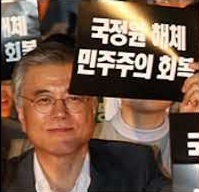
Moon Jae-in holds a sign: Dismantle the NIS
The latest case, which is still on going, is the case of retired Colonel Cheong Kyu-phil (정규필). Former NIS officials call it “the Moon regime’s fake espionage case.” Colonel Cheong had been a covert agent and an attache in a South Korean mission in China. In 2019, as in other cases, he was falsely accused of espionage, specifically selling secrets to Chinese and North Korean officials. Despite search and seizure, the prosecution found no evidence and he was cleared of the espionage charge in February 2020. But it was not over. He was soon charged with violating the Military Secrets Protection Act for possessing classified information, which Cheong found preposterous. Colonel Cheong has been fighting this battle for the past 5 years, losing 44 pounds in the process.
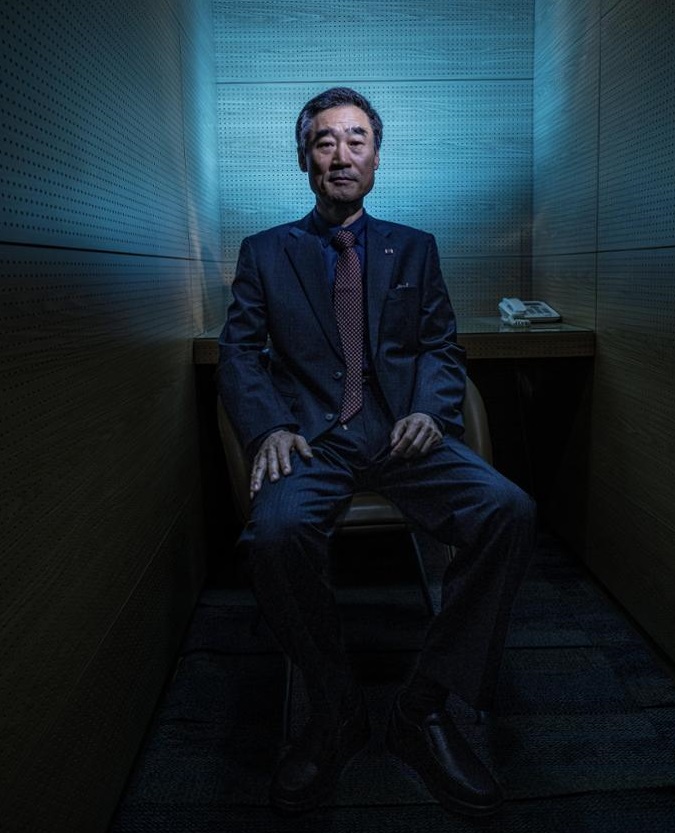
Retired Colonel Cheong Kyu-phil; Source: Korea Times photo by Shim Hyun-chul
The Supreme Court is expected to decide his fate sometime around May 17, 2024.
Colonel Cheong Kyu-phil had risked his life for his country, conducting clandestine operations to collect intelligence on North Korea. After graduating from the Korean Military Academy, he began his career in special operations. He was assigned to various intelligence organizations including Korea Defense Intelligence Command (KDIC) and the Defense Security Command. He retired from the military after 37 years of honorable service. Choi Su-yong, former NIS official who also was an operative, described Colonel Cheong as an extraordinarily skilled operative, an “ace” in the field. (59:40) Another intelligence official called him “a legend.”
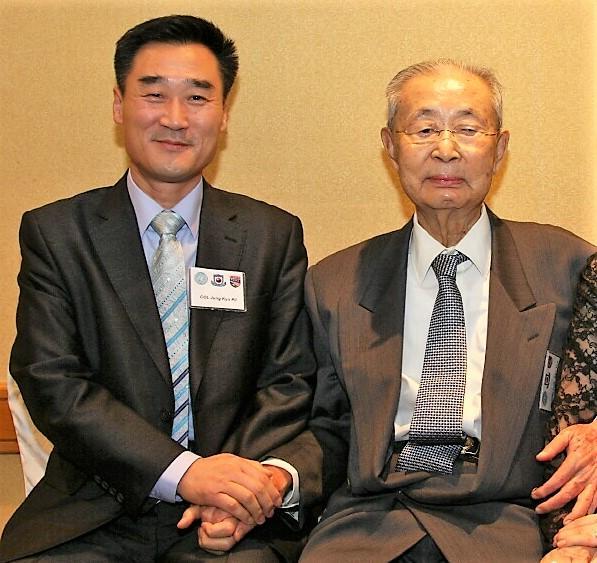
Colonel Cheong Kyu-phil with General Paik Sun-yup at a ROK-US Combined Forces Command event in 2013
Colonel Cheong’s nightmare began slightly over a month after his retirement from the military. On May 14, 2019, 21 young NIS agents arrived at his residence with a search warrant, accusing him of espionage. Cheong thought it was absurd, since that’s not the kind of person he is, and even freely gave them his email passwords to check. The search lasted from 7:50 a.m. until 6:20 a.m. the next day, and found nothing. Certain of his innocence and in sympathy for the agents who had to continue to work long hours, he told them to just take everything, so they took about 100 items from his house. Investigations showed that there was no basis for the allegations and all charges were dropped.
He discovered that the accusation of espionage was based on a statement from Lee Young-kwon (이영권) of the NIS, but no one knew who he was initially; certainly Cheong did not know someone by that name. Much later, it was discovered that the so-called Lee Young-kwon was actually Kim Yong-woo (김용우), who was promoted twice after he accused Cheong. On April 16, 2018, only 2 weeks after Cheong’s retirement, Kim wrote the statement that led to the search and seizure of Cheong’s residence. If Cheong was still in the military, the proper jurisdiction would have been DSC. The timing of waiting after he retired seems to indicate that they did not want DSC to investigate.
Another person who accused Cheong was Ryu Won-ho (류원호) of the Defense Security Command (DSC), to whom Colonel Cheong reported during 2013-2014. It is suspected that Ryu provided the false content suspecting Cheong under threat one month after Ryu’s retirement. Ryu’s accusations became one of the bases for a legal action against Colonel Cheong. If Ryu suspected Cheong, he could have reported it in 2013-14, but he did not. Also, if he really suspected Cheong and reported it then, the investigation would have been handled by the DSC. It is suspicious also that Ryu reported it to the NIS, rather than DSC.
At that time when the charges against Colonel Cheong began, Suh Hoon (서훈), appointed by Moon ae-in, was the director (2017-5-10 to 2020-7-3) of the National Intelligence Service (NIS). Suh Hoon is notorious for being one of Moon Jae-in’s circle of close associates involved in forcibly sending the two fishermen who defected from North Korea back to North Korea across the DMZ against their will on November 7, 2019, as well as misleading the U.S. by portraying North Korea as being willing to denuclearize only if the U.S. would meet Kim Jong-un.
Suh Hoon created the “Jeokpae Cheongsan Task Force” (적폐청산TF) in June 2017 and appointed Cho Nam-kwan (조남관) , former prosecutor, to direct it. The Moon Jae-in administration also launched the “NIS Reform and Development Committee (국정원개혁발전위원회) to weed out the dedicated patriotic professionals at NIS in the name of “reform.” The Committee was chaired by Professor Jeong Hae-gu (정해구), a leftist professor, and populated by civilians unfamiliar with the intelligence field, but who shared the same ideological leanings as Jeong Hae-gu. Among many of its misdeeds, it accessed the NIS central server, which contains extremely sensitive information, including on South Korea’s HUMINT network.
Park Jie-won replaced Suh Hoon as the NIS director (2020-7-29 to 2022-5-11). Park Jie-won, a right hand man of Kim Dae-jung, was notorious for having transferred $500 million to North Korea as a bribe to hold the 2000 summit between Kim Dae-jung and Kim Jong-il, for which Kim received the Nobel Peace Prize. Park went to jail for his role over a decade ago, and then returned to politics. He played a crucial role in impeaching President Park Geun-hye while he was the head of the People’s Party by getting Kim Moo-sung, the head of the Saenuri Party (President Park geun-hye was a member), to garner enough votes to impeach the president from her own party.
Moon Jae-in’s NIS director was so interested in this case that the NIS investigation reports on the case against Colonel Cheong was apparently reported directly and frequently to the NIS director. As mentioned, both Suh Hoon and Park Jie-won were NIS directors under Moon.
The NIS does not have authority to indict, so it transferred the seized items to the prosecution, who found no evidence of espionage. The prosecutors however, indicted Cheong on another charge, that of violating the Military Secrets Protection Act. They re-constructed deleted files from a seized external drive and used them to charge Cheong with possessing such files.
Cheong found the whole accusation absurd. Some of the files were created by Cheong himself in 2013 when he worked as the attache in China, and they were declassified a year later. Before he retired, he deleted the files as he was going through his hard drive, but the NIS recreated the files through forensics, and then accused Cheong of the violation, having failed to find any evidence of espionage.
Besides the significant problems with the charges, another problem was the way that sensitive national security information was handled. Normally, sensitive information like this was handled by courts associated with the Defense Security Command where the information is protected. Instead, the NIS submitted the information in public court, and the case was tried in between sexual assault and fraud cases, and all of the sensitive information in the case including his identity was made open to the general public.
During the initial case, Judge Kim Chang-mo (김창모) found him guilty and sentenced him to six months in prison suspended for one year. The appeals court judge, Kang Hee-suk (강희석), increased the sentencing to ten months in prison suspended for two years. These courts handle primarily sexual assault and fraud cases, so they are used to viewing the accused as sexual molesters and frauds and their decisions reflect such views. They do not understand the intricacies of handling sensitive national security information and the impact of their actions in handling these national security cases.
Exposing to the public the identity of Colonel Cheong and other relevant personnel as well as certain clandestine operations details puts everyone that works in their field at risk. These cases should be handled at specialized places, such as the Defense Security Command, which can better discern the situation.
Colonel Cheong stated, “The NIS collapsed in 2017, the Defense Security Command was disbanded in 2018, and the military intelligence (HUMINT) organization collapsed from early 2019. In the past, the NIS would have protected and shielded KDIC in a large framework, but the NIS itself stepped in to crush me and the agents of KDIC. I don’t think our [fellow intelligence organization] acted as agents of the enemy, but it is a sad situation. Still, I believe that the NIS must play its role as the last bastion [to defend] the state in order for the country to exist. Although, personally, I’m sorrowful. It takes one year to grow a crop, 10 years to grow a tree, and 30 years to grow a person. It’s not a 100-year plan, but 30 years is a lot of work. After the establishment of diplomatic relations [with the Republic of Korea] in 1992, China invited its people who had remained in Korea since 1945 to China and encouraged them. What an enviable and terrifying country. When will we [treat our intelligence agents like that]? The Republic of Korea, which only destroys those who worked hard. I’m really worried.”
Implications
Personal
Colonel Cheong dedicated 37 years of his life, risking his life in risky missions to defend his country. As a retired military officer, he receives a military pension. If the Supreme Court finds him guilty, then he would not only lose his pension, but would have to pay back all of his post-retirement pension that he had received.
Also, it would take away honor from a person who served his country admirably.
KDIC and HUMINT Capability in general
South Korea’s human intelligence (HUMINT) capabilities are gravely degraded as secret information about KDIC and its agents, including Cheong’s identity as a former undercover intelligence agent in China gathering intelligence about North Korea were revealed to the public during the investigations and trials.
‘A symbolic figure in the work of countering North Korea has been accused of espionage, and all operations against North Korea have been paralyzed,’ according to multiple intelligence officials.
While this has already had a chilling effect on South Korean intelligence agencies, dedicated professionals in South Korea’s intelligence community would see what happened to Colonel Cheong and become even more risk-averse, and not seek out intelligence regarding North Korea.
Beneficiaries
Who benefits from undermining of South Korea’s human intelligence capability? China and North Korea.
For more details on Colonel Cheong’s ordeal, see here (in English) and here for former NIS official Choe’s description of the case (in Korean, but can select the English translation subtitle option).

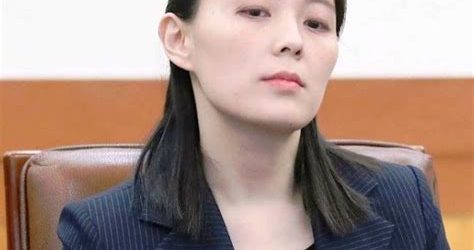
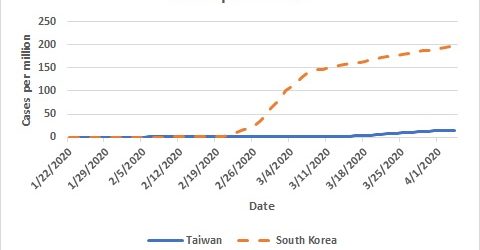
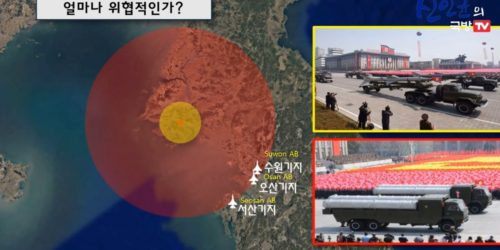
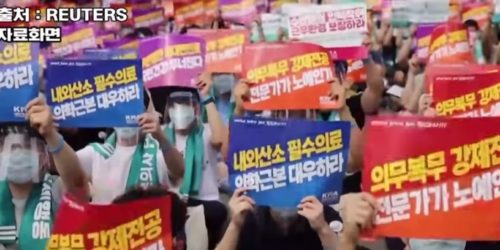

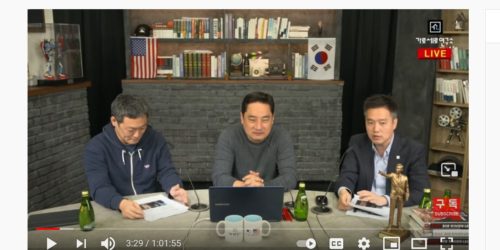
So, how does this affect intelligence sharing between the Republic of Korea, Japan, and the United States?